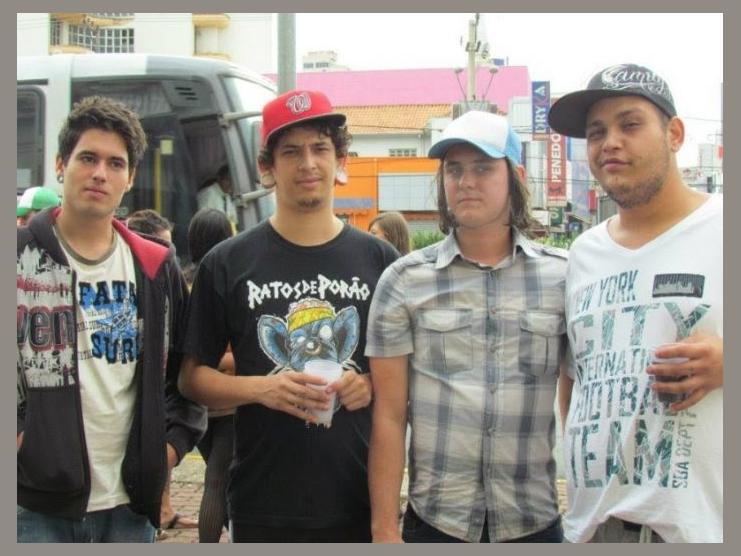 Cade Mussum
Cade Mussum
Baladinha de Ladrão: The Saga of Cade Mussum
In the vibrant tapestry of Brazilian music, the enigmatic band Cade Mussum stands out with their infectious melodies and socially conscious lyrics. Their signature song, "Baladinha de Ladrão," became an anthem for the marginalized and a symbol of their unwavering commitment to speaking truth to power.
The Genesis of a Movement
Cade Mussum was founded in 2003 by three friends from the impoverished favelas of Rio de Janeiro: MC Dengue, MC Magrinho, and DJ Pimenta. United by their shared passion for music and their desire to uplift their community, they began crafting songs that chronicled the daily struggles and injustices they witnessed.
"Baladinha de Ladrão," released in 2008, catapulted the band to fame. The song's catchy beat and poignant lyrics, which denounced police brutality and the pervasive corruption within Brazil's political system, resonated deeply with the Brazilian public. The band quickly became known for their fearless activism and their unwavering commitment to social change.
Challenges and Controversies
Cade Mussum's outspoken nature has often drawn controversy. The band has faced censorship and legal challenges for their lyrics, which some have deemed too inflammatory. They have also been criticized for their alleged association with criminal elements.
Undeterred, the band has remained steadfast in their mission to raise awareness of the systemic issues plaguing their community. Their music has become a powerful voice for the voiceless and a catalyst for social dialogue.
Discography
Cade Mussum has released four acclaimed albums:
* *Baladinha de Ladrão* (2008)
* *Vida Bandida* (2012)
* *Favelão* (2016)
* *Resistência* (2020)
Each album showcases the band's unique blend of samba, funk, and rap, with lyrics that address a wide range of social and political issues, from police violence to racial inequality.
Members
* MC Dengue (vocals)
* MC Magrinho (vocals)
* DJ Pimenta (turntables)
* DJ Serginho (turntables, additional vocals)
* MC Carol (guest vocalist on "Resistência")
Legacy and Impact
Cade Mussum has become a symbol of hope and resistance for marginalized communities throughout Brazil. Their music has inspired countless artists and activists to use their voices to speak out against injustice. The band's legacy endures as a testament to the power of music to ignite social change.
In the vibrant tapestry of Brazilian music, the enigmatic band Cade Mussum stands out with their infectious melodies and socially conscious lyrics. Their signature song, "Baladinha de Ladrão," became an anthem for the marginalized and a symbol of their unwavering commitment to speaking truth to power.
The Genesis of a Movement
Cade Mussum was founded in 2003 by three friends from the impoverished favelas of Rio de Janeiro: MC Dengue, MC Magrinho, and DJ Pimenta. United by their shared passion for music and their desire to uplift their community, they began crafting songs that chronicled the daily struggles and injustices they witnessed.
"Baladinha de Ladrão," released in 2008, catapulted the band to fame. The song's catchy beat and poignant lyrics, which denounced police brutality and the pervasive corruption within Brazil's political system, resonated deeply with the Brazilian public. The band quickly became known for their fearless activism and their unwavering commitment to social change.
Challenges and Controversies
Cade Mussum's outspoken nature has often drawn controversy. The band has faced censorship and legal challenges for their lyrics, which some have deemed too inflammatory. They have also been criticized for their alleged association with criminal elements.
Undeterred, the band has remained steadfast in their mission to raise awareness of the systemic issues plaguing their community. Their music has become a powerful voice for the voiceless and a catalyst for social dialogue.
Discography
Cade Mussum has released four acclaimed albums:
* *Baladinha de Ladrão* (2008)
* *Vida Bandida* (2012)
* *Favelão* (2016)
* *Resistência* (2020)
Each album showcases the band's unique blend of samba, funk, and rap, with lyrics that address a wide range of social and political issues, from police violence to racial inequality.
Members
* MC Dengue (vocals)
* MC Magrinho (vocals)
* DJ Pimenta (turntables)
* DJ Serginho (turntables, additional vocals)
* MC Carol (guest vocalist on "Resistência")
Legacy and Impact
Cade Mussum has become a symbol of hope and resistance for marginalized communities throughout Brazil. Their music has inspired countless artists and activists to use their voices to speak out against injustice. The band's legacy endures as a testament to the power of music to ignite social change.